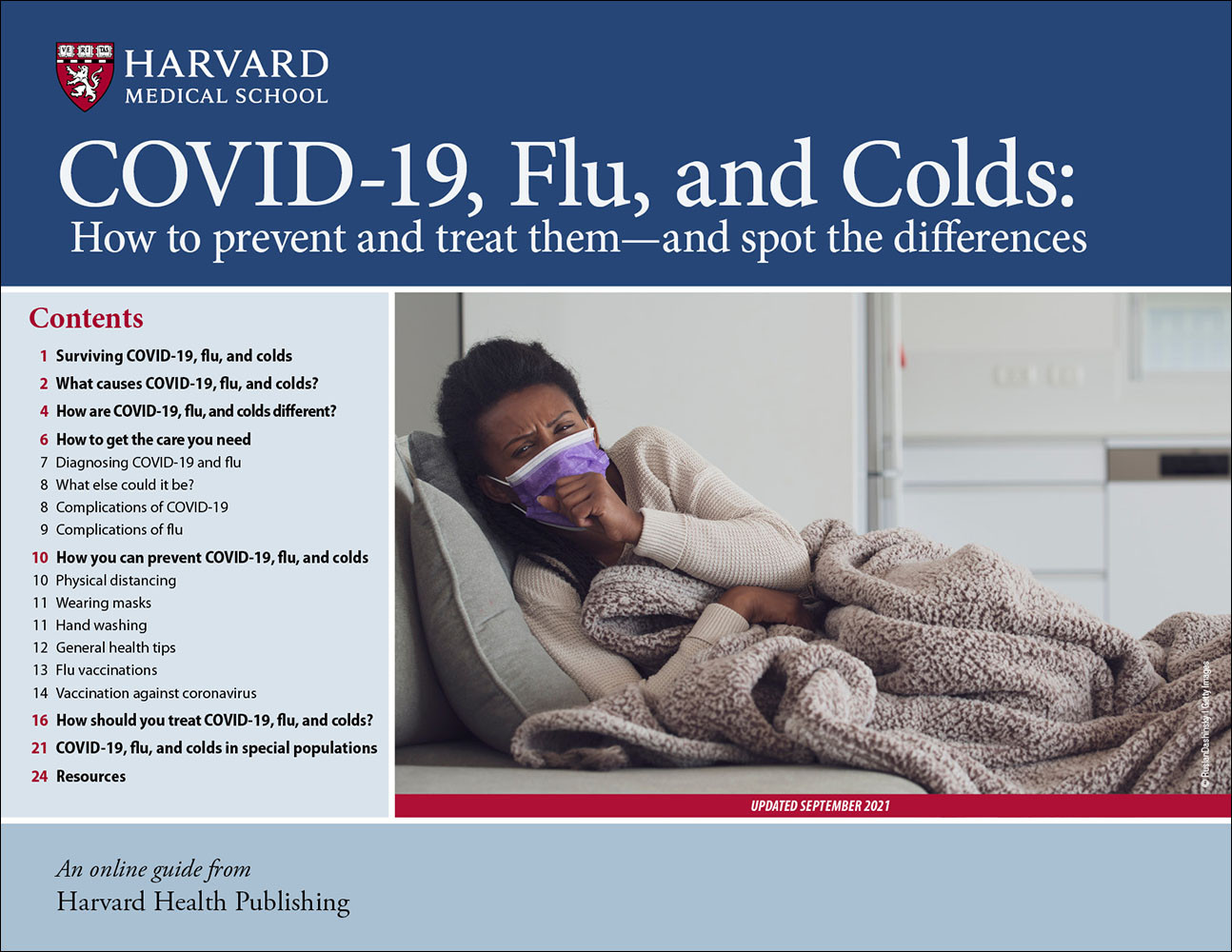The complicated risks of simple cold remedies
Even the most common remedy can cause side effects and adverse drug interactions.
- Reviewed by Anthony L. Komaroff, MD, Editor in Chief, Harvard Health Letter; Editorial Advisory Board Member, Harvard Health Publishing

Brightly packaged cold remedies are easy to find and offer the promise of quick relief. That doesn’t mean you can take them without considering the risks of the medications they contain, such as decongestants, antihistamines, cough suppressants, and painkillers.
“The term 'over the counter’ doesn’t mean harmless,” says Jigar Mehta, a pharmacist at Harvard-affiliated Beth Israel Deaconess Medical Center. “These medications still have powerful effects on the body and can interact with prescriptions or worsen certain health conditions.”
Here’s what you need to know about common cold remedies and how they may affect you.
Decongestants
Decongestants narrow blood vessels to shrink swollen membranes in the nasal passages, allowing more air to pass through them. Some decongestants — such as pseudoephedrine (Sudafed) — are taken orally, and some — such as oxymetazoline (Afrin) — are inhaled.
But decongestants have several risks. They can increase your blood pressure and heart rate, and (because they are also stimulants) the drugs can cause anxiety, insomnia, and disrupted sleep. The drugs aren’t recommended for people with heart disease, high blood pressure, a history of stroke, angina, or diabetes.
Additionally, if you use an over-the-counter decongestant nasal spray for more than a few days in a row, it can lead to greater swelling than you experienced initially.
A recent concern about one decongestant in particular — phenylephrine (Neo-Synephrine, Sudafed PE) — is that it’s been found to be ineffective when taken orally. “It highlights why we need to look closely at what’s in these products instead of assuming every option on the shelf is effective,” Mehta says. In 2024, the FDA proposed removing products with phenylephrine from shelves, but that hasn’t happened yet.
Antihistamines
Antihistamines such as diphenhydramine (Benadryl), chlorpheniramine (Chlor-Trimeton), and doxylamine (Unisom) decrease the production of histamine, a substance that causes runny nose, watery eyes, and sneezing. They also have a sedative effect and are frequently found in nighttime cold remedies to help you sleep.
The risk of antihistamines is that they block the effects of acetylcholine, a brain chemical responsible for brain stimulation and activity. When acetylcholine is blocked, you can feel groggy or confused. This side effect becomes more common as we get older and the body takes longer to eliminate medications. And when you’re feeling confused, you might fall and get injured.
If, in addition, you take other drugs that block acetylcholine, such as certain antidepressants or bladder medications, the risk of confusion and falls increases even more.
Cough suppressants
Drugs that help you stop coughing target the brain, not your throat or lungs. Coughing is a reflex controlled by the brain and quieted by the medicine.
The cough suppressant that’s in most cold remedies is dextromethorphan. While it’s effective, it has some risks. “In the right dose, dextromethorphan is safe for most people, but taking too much can cause dizziness, confusion, or even changes in mood or thinking,” Mehta explains. “That risk is greater if someone is already taking other medications that affect the brain.”
Painkillers
Nonprescription painkillers —such as acetaminophen (Tylenol) or nonsteroidal anti-inflammatory drugs (NSAIDs), including ibuprofen (Advil) — are found in many cold and flu remedies. The drugs relieve headaches and body aches and reduce fevers.
But over-the-counter painkillers can be dangerous. Taking high amounts of acetaminophen — over 3,000 to 4,000 milligrams (mg) per day (more than six to eight extra-strength pills) — can damage your liver.
Taking any amount of ibuprofen slightly increases the short-term risk of heart attack or stroke. Long-term use of NSAIDs can increase blood pressure or lead to stomach bleeding. High daily doses of NSAIDs can cause kidney damage.
The trouble with combinations
For convenience, many cold medicines contain two or more different types of drugs in one dose. Examples include Dayquil, Nyquil, Tylenol Cold and Flu, Advil Cold and Sinus, or any preparation that treats more than one symptom. However, combination drugs set you up for two risks.
One is that you might not need all of the medications in a particular treatment. Why risk the potential side effects unnecessarily?
The other is that you might wind up taking too much painkiller. “Cold remedies often include acetaminophen or ibuprofen because they target fever, headaches, and body aches, which are some of the most common cold and flu symptoms,” says Mehta. “But if you add a separate dose of Tylenol or Advil on top, you can easily exceed the safe daily limits. That’s where people get into trouble. They think they’re treating different symptoms, but they’re really doubling up on the same ingredient.”
What you should do
Before you down a cold remedy in a moment of discomfort, give it some consideration.
Look at the ingredient list. Select the remedy that treats only the symptoms you have. For example, if you are coughing and sneezing but are not in pain, avoid the cold remedy that has painkillers.
Think about your other medications. Would any of them be affected by the drugs in the cold remedy you’d like to take? “Cold medicines can interact with common prescriptions, from blood pressure and heart medications to antidepressants and diabetes drugs,” Mehta says. “When in doubt, a quick check with your pharmacist can help prevent a serious problem.”
Don’t double up on painkillers. Don’t take separate acetaminophen or NSAID pills to relieve pain if the same drug is already in your cold remedy. “You don’t want to unintentionally overload your liver, kidneys, or stomach,” Mehta says.
Get advice. When you’re unsure if you can take a certain cold remedy ingredient, ask your doctor or pharmacist.
Follow the directions. Don’t take more than the recommended dose listed on the product.
Take care of yourself. Cold remedies can ease your symptoms, but your body needs a little extra help when you’re fighting a cold. So get lots of sleep, stay hydrated, go easy on daily activity, and avoid junk food.
Image: © Sean Anthony Eddy/Getty Images
About the Author

Heidi Godman, Managing Director
About the Reviewer

Anthony L. Komaroff, MD, Editor in Chief, Harvard Health Letter; Editorial Advisory Board Member, Harvard Health Publishing
Disclaimer:
As a service to our readers, Harvard Health Publishing provides access to our library of archived content. Please note the date of last review or update on all articles.
No content on this site, regardless of date, should ever be used as a substitute for direct medical advice from your doctor or other qualified clinician.
















